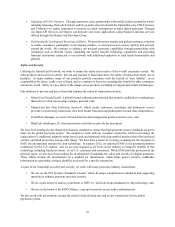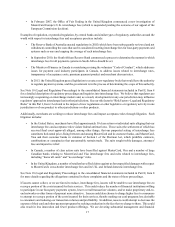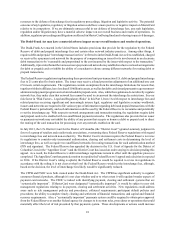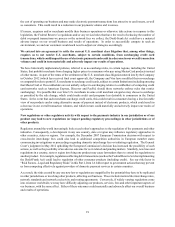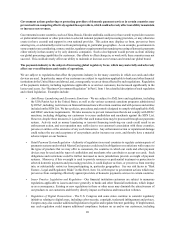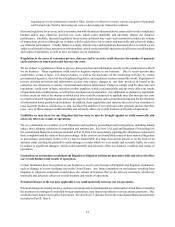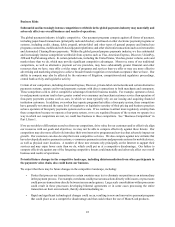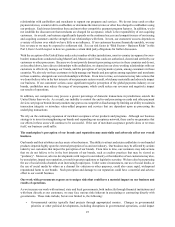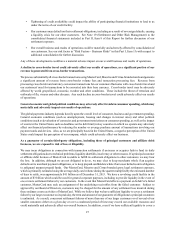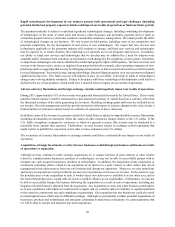MasterCard 2013 Annual Report Download - page 24
Download and view the complete annual report
Please find page 24 of the 2013 MasterCard annual report below. You can navigate through the pages in the report by either clicking on the pages listed below, or by using the keyword search tool below to find specific information within the annual report.20
Government actions preferring or protecting providers of domestic payment services in certain countries may
prevent us from competing effectively against those providers, which could adversely affect our ability to maintain
or increase our revenues.
Governments in some countries, such as China, Russia, Ukraine and India could act (or have acted) to provide resources
or preferential treatment or other protection to selected national payment and processing providers, or may otherwise
create (or have created) and support its own national provider. This action may displace us from, prevent us from
entering into, or substantially restrict us from participating in, particular geographies. As an example, governments in
some countries are considering, or may consider, regulatory requirements that mandate processing of domestic payments
either entirely in that country or by only domestic companies. Such a development would prevent us from utilizing
our global processing capabilities for customers. Our efforts to effect change in, or work with, these countries may not
succeed. This could adversely affect our ability to maintain or increase our revenues and extend our global brand.
The payments industry is the subject of increasing global regulatory focus, which may materially and adversely
affect our overall business and results of operations.
We are subject to regulations that affect the payments industry in the many countries in which our cards and other
devices are used. In particular, many of our customers are subject to regulations applicable to banks and other financial
institutions in the United States and abroad, and, consequently, we are at times affected by such regulations. Regulation
of the payments industry, including regulations applicable to us and our customers, has increased significantly in the
last several years. See “Business-Government Regulation” in Part I, Item 1 for a detailed description of such regulation
and related legislation. Examples include:
• Anti-Money Laundering and Economic Sanctions - We are subject to AML laws and regulations, including
the USA Patriot Act in the United States, as well as the various economic sanctions programs administered
by OFAC, including restrictions on financial transactions with certain countries and with persons and entities
included on the SDN List. We have policies, procedures and controls designed to comply with applicable AML
and OFAC sanctions requirements. We take measures to prevent transactions that do not comply with OFAC
sanctions, including obligating our customers to screen cardholders and merchants against the SDN List.
However, despite these measures, it is possible that such transactions may be processed through our payments
system. Activity such as money laundering or terrorist financing involving our cards could result in an
enforcement action, and our reputation may suffer due to our customer's association with those countries,
persons or entities or the existence of any such transaction. Any enforcement action or reputational damage
could reduce the use and acceptance of our products and/or increase our costs, and thereby have a material
adverse impact on our business.
• Retail Payment System Regulation - Authority of regulators in several countries to regulate certain aspects of
payments systems under which MasterCard operates could result in obligations or restrictions with respect to
the types of products that we may offer to consumers, the countries in which our cards and other payment
devices may be used and the types of cardholders and merchants who can obtain or accept our cards. Such
obligations and restrictions could be further increased as more jurisdictions provide oversight of payment
systems. Moreover, if this oversight is used to provide resources or preferential treatment or protection to
selected domestic payments and processing providers, it could displace us from, or prevent us from entering
into, or substantially restrict us from participating in, particular geographies. See our risk factor in “Risk
Factors - Legal and Regulatory Risks” in this Part I, Item 1A, with respect to government actions which may
prevent us from competing effectively against providers of domestic payments services in certain countries.
• Issuer Practice Legislation and Regulation - Our financial institution customers are subject to numerous
regulations applicable to issuers and more generally to banks and other financial institutions, which impact
us as a consequence. Existing or new regulations in these or other areas may diminish the attractiveness of
our products to our customers and thereby directly impact our business and transaction volumes.
• Regulation of Digital Transactions - The U.S. Congress and some states continue to consider regulatory
initiatives relating to digital areas, including cyber-security, copyright, trademark infringement and privacy.
Congress may also consider additional legislation to legalize and regulate Internet gambling. If implemented,
any such regulation could impose additional compliance burdens on us and/or our customers, including


